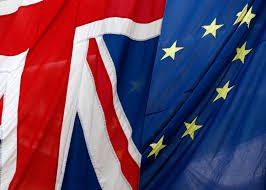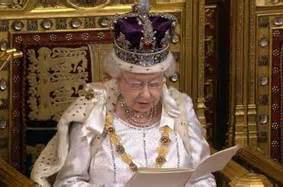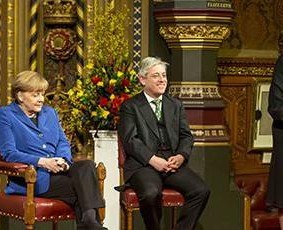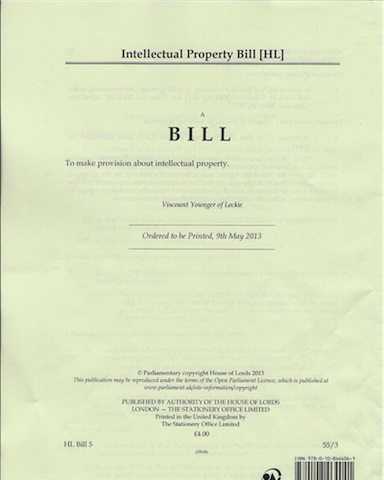Lord C-J says Ministers must ensure the multi-billion pound fashion industry industry is not put at risk
This is a piece I recently did for the House Magazine: ‘From fashion to furniture, Britain’s design sector relies on EU protections, writes Lord Clement-Jones’.
It was notable from her speech at the Mansion House earlier this month that the Prime Minister has woken up to the threat to our broadcasters of exit from the EU through loss of country of origin rules – the rules which have enabled the UK to operate as an international broadcasting hub.
The fact is, however, that this is but one of the many severe threats to our creative industries posed by Brexit.
The Prime Minister also needs to recognise the threat posed by Brexit to the design sector, which includes the fashion industry and furniture lighting and furnishings and many other design areas, from the potential loss of European unregistered design rights for United Kingdom-generated designs.
European design laws protect the individual character of a design, in particular as they relate to shape, texture, contours, lines, colour, ornamentation or materials. UK unregistered design right protects only the shape and configuration of a design.
Recently the Law Society made the news when it revealed that London Fashion Week is under serious threat from Brexit. They said it could lose its status as an event where new clothing creations are unveiled because laws that protect European fashion houses from unauthorised copying may no longer apply in London when Britain leaves the EU next year.
Fashion houses that first reveal an unregistered design on the London catwalk would be at risk from copies going on sale in the EU.
"As the majority in the industry are micro and SME design innovators with less than four employees they are particularly vulnerable to infringement of their designs."
— Lord Clement-Jones
In 2016 the value of UK fashion and textile exports stood at £9.1bn. The fashion industry, through the British Fashion Council, has highlighted the serious consequences for British fashion designers if they lose unregistered EU design rights protection in the other 27 member states. Potentially losing the protection currently available under EU law will leave these UK designers in a disadvantageous position versus their EU competitors.
These are typical but high profile examples of how designers across the board may be forced to launch new designs in EU countries after Brexit.
The potential impact to our economy is massive. UK design and design skills in the UK are currently worth a startling £209bn. This is put at risk if legal protection for design IP is weakened.
The reason for this is that copying is endemic not only in the fashion sector but in the lighting, furniture, furnishings, gift and product and many more design sectors, all of which will also be affected by loss of the EU unregistered design right. As the majority in the industry are micro and SME design innovators with less than four employees they are particularly vulnerable to infringement of their designs.
In the Lords this Thursday I will be seeking a firm assurance from the government that it will provide a solution to the potential loss of EU design rights in one of the fastest growing sectors in the economy. I will be calling on ministers to end this major threat to our design sector and introduce legislation which will offer the same EU unregistered IP rights’ protection as they now enjoy in 28 member states.
Unlike some other Brexit conundrums, in this case the solution lies in government’s hands and we and the design industry have every right to expect urgent action.
Brexit: Why Freedom of Movement Restrictions Will Impact on the Creative Industries
Here is a piece I wrote for the House Magazine recently.
Freedom of Movement and the Creative industries
Our creative industries are of ever growing importance to the UK economy quite apart from their cultural value. Worth £87bn to the UK economy, they are growing three times as fast as other sectors of the economy and account for nearly 2 million jobs. They have massively benefited from our membership of the EU.
As witnesses from the creative services sector recently underlined to the House of Lords EU Select Committee looking at the impact of Brexit on Non Financial Services, maintaining continued access to the EU’s labour market to address skills shortages and to support continued growth is vital.
The Creative industries Federation in their Brexit Report last autumn said: “Talent and skills are fundamental to the UK’s creative sucess. It is vital we continue to cultivate our own talent as well as to attract the best and brightest from around the world.”
The UK is a creative hub, the free movement of people to work and travel across Europe, without the need for visas, has both facilitated, and fuelled, the exchange of culture, creativity and expertise and generated commercial and artistic opportunities.
Without the right deal, the creative industries will face big challenges if restrictions are placed on the movement of talent and skills.
For example London is Europe’s hub for start-ups and first jobs in fashion. To further their careers fashion graduates need experience at a wide range of international fashion houses. A lot of people who work in fashion are not British and many students when they graduate get jobs abroad. The music industry, too, relies heavily on the movement of national and international talent.
Although overall 6.1% of Creative Industries workforce are EU (non-British) nationals, particular sectors are heavily represented. It is estimated that 25% of the VFX (visual effects in film) workforce is from the EU, up to 30% in gaming is made up of EU (non-British) nationals and 10% of the design, publishing and advertising workforce are EU (non-British) nationals.
Of course we should aspire to more home-grown talent –and Sir Peter Balzaghette’s review of industrial strategy for the creative industries should address this urgently to ensure that our education and training policies fully recognize the specific needs of the creative industries-but as it is there are currently 17 creative roles which are on the government’s Shortage Occupation List (allowing recruitment from outside the EEA) from orchestral musicians to graphic designers. This shortage list will increase following Brexit if freedom of movement is ended and adequate visa arrangements are not put in place.
On Brexit the ability to develop audiences by low cost touring within the EU, a significant earner for young talent, could end. One visa application for a non EU cultural organisation costs between £600 to £1,000. In line with the Arts Council sector survey of the arts and culture, the continued ability for people to move freely between the UK and EU for creative activities such as television and film production, concerts and fashion events is vital.
Our immigration system must continue to enable easy access to critical skills and talent from both EU and non-EU countries. Above all we must ensure as the Liberal Democrats insisted during the passing of the European Union (Notification of Withdrawal) Act, non-British EU citizens currently employed in the UK must have the right to stay.
Liberal Democrats have always been champions of creators and of their industries. The Government must listen to these strong concerns when Brexit negotiations begin.
Lord C-J asks: Will this Government build on the achievements of the last?
This week in the debate on the Queen's Speech I urged the Government to build on the positive record of the coalition government in its support for the development of the UK's creative industries.
The UK’s creative industries have been one of the great success stories of the past five years. Significant policies benefiting these industries were developed during the coalition Government. I pay tribute to Vince Cable for all his work as the Business Secretary.
I want to see creative businesses continue to thrive across the whole country so that our economy can continue to reap the benefits. It is vital that we do not lose the momentum. Will this Government build on the achievements of the last? That is the question.
To maintain that momentum we need to encourage clustering of creative businesses developed through alliances between central government, local authorities, universities and the private sector in our major cities. Our cities and many counties need greater powers, especially over finance. I therefore welcome in principle the proposed cities and local government Bill as part of the Government’s northern powerhouse strategy.
Many noble Lords have talked about development of digital skills being vital. Expansion of digital platforms has highlighted the growing convergence of creative content and the tech sector. Skills in the arts and sciences are increasingly drawn together. Will the Government promote the value of creative subjects in schools and ensure that they are rewarded for offering a broad and balanced curriculum?
The number of apprenticeships created and taken up in the creative industries has expanded hugely in the past few years. I hope that they will enhance the co-ordination of action on skills by merging the two skills councils, Creative and Cultural Skills and Creative Skillset, into a single powerful and effective body. Will the Home Office break the habit of a lifetime and ensure with BIS that the tech and creative industries are able to fill the gaps in high-end skills, from abroad if necessary?
As we have heard today, our broadcasters are the linchpin of the creative industries and there are some key questions in that regard. Will the Government maintain Channel 4 in public ownership? Will they follow up the consultations started in March on Section 73 of the Copyright, Designs and Patents Act, which requires public service broadcasters to give away their most valuable product—their channels—to the pay-TV cable platform in the UK, and repeal it?
We had a mini debate on the BBC today and contributions on the BBC were made yesterday. Under John Whittingdale’s chairmanship, the Culture, Media and Sport Committee produced a valuable report on the future of the BBC with many useful observations and recommendations, including on governance and extension of the licence fee to iPlayer-only users, which can, and no doubt will, be taken forward into the charter discussions—and so too, I hope, will the committee’s views on the need for open and transparent discussions on the charter. Will there be a full and open debate on any decriminalisation proposals and will the potential financial cost of such a policy to the BBC be fully recognised? We need strenuously to protect the independence of the BBC. Currently, the licence fee is the best way of doing that. However, that does not mean that it needs to rise faster than inflation.
Investment in the UK’s creative industries can only really make a difference if their intellectual property rights, particularly those relating to the protection of their online materials, are properly understood and enforced. It was good to see the acknowledgement in the Conservative manifesto of the importance of intellectual property and of proper behaviour by search engines. However, I was rather baffled by some of the statements in the manifesto. It says:
“We will protect intellectual property by continuing to require internet service providers to block sites that carry large amounts of illegal content”.
I do not recall that we were able to persuade the last Government to bring in any legislation to do that. The legislation remained unenforced on the books, so I think there are questions to be asked about that. Is it not crucial that we should educate consumers on the importance of intellectual property and support initiatives designed to get voluntary agreement from the advertisers and credit card companies not to advertise on infringing sites?
Will the Government continue to support the long-term funding of the Police Intellectual Property Crime Unit, or PIPCU, which carries out such vital work? Will they increase sanctions relating to online offences in line with the recent government review of penalties for online copyright infringement, Penalty Fair?
I regret that we shall spend the next two years arguing about membership of the EU. I hope that, at the same time, the Minister will find time to work with our EU partners to ensure that proposals for copyright reform as part of the single digital market proposals do not damage our creative industries by limiting territorial licensing.
I very much hope that the Government will continue discussions with artists and creators on extending the law governing unfair contracts to include intellectual property contracts. I very much hope that, when possible under EU law, the application of public lending rights to remote e-lending will be extended.
II very much hope that the Government will continue to promote the value of live music despite the powers created in the Anti-social Behaviour, Crime and Policing Act, which are already being used disproportionately. I agree 100% with the noble Baroness, Lady Liddell, and with the comments made by my noble friend Lord Lee yesterday, on the importance of our tourism industry, which so far, even after five years of the last Government, has been treated as a Cinderella and holds such promise for job creation in the years up to 2020. Time will tell.
In her response Baroness Neville-Rolfe the IP Minister said:
"To make sure that the UK retains its position as the world’s best IP regime, we will also focus on a number of measures including: improving our rights-granting services; reforming the law to improve protection for businesses; striving to improve international patent systems; and educating businesses and consumers about IP. The consultation on Section 73 is continuing. The noble Lord, Lord Clement-Jones, is right to say that enforcement is incredibly important. It is great that we have managed to extend the life of PIPCU, and we are looking at future options for funding. He will also be very glad to know that we have used Section 97A to block access to websites alleged to host 10 million infringing e-books"
Angela Merkel Comes to Town
Very well received speech by the German Chancellor when she spoke to both Houses of Parliament. Some important messages about changes that could and couldn't be made to EU treaties. Even saw some Tory MP's clapping! Very witty intro from Speaker Bercow too.
http://www.parliament.uk/documents/addresses-to-parliament/Angela-Merkel-address-20130227.pdf
Intellectual Property Bill
The Intellectual Property bill had its Second Reading on 22nd May. Whilst most of it's provisions are welcome there are a number of omissions that we argued should be corrected during the passage of the Bill through the House of Lords, in particular to align criminal offences for registered designs with those of unregistered design, to provide a remedy for lookalike products which mislead the consumer and to align criminal penalties for digital and physical copyright infringement.Read more





